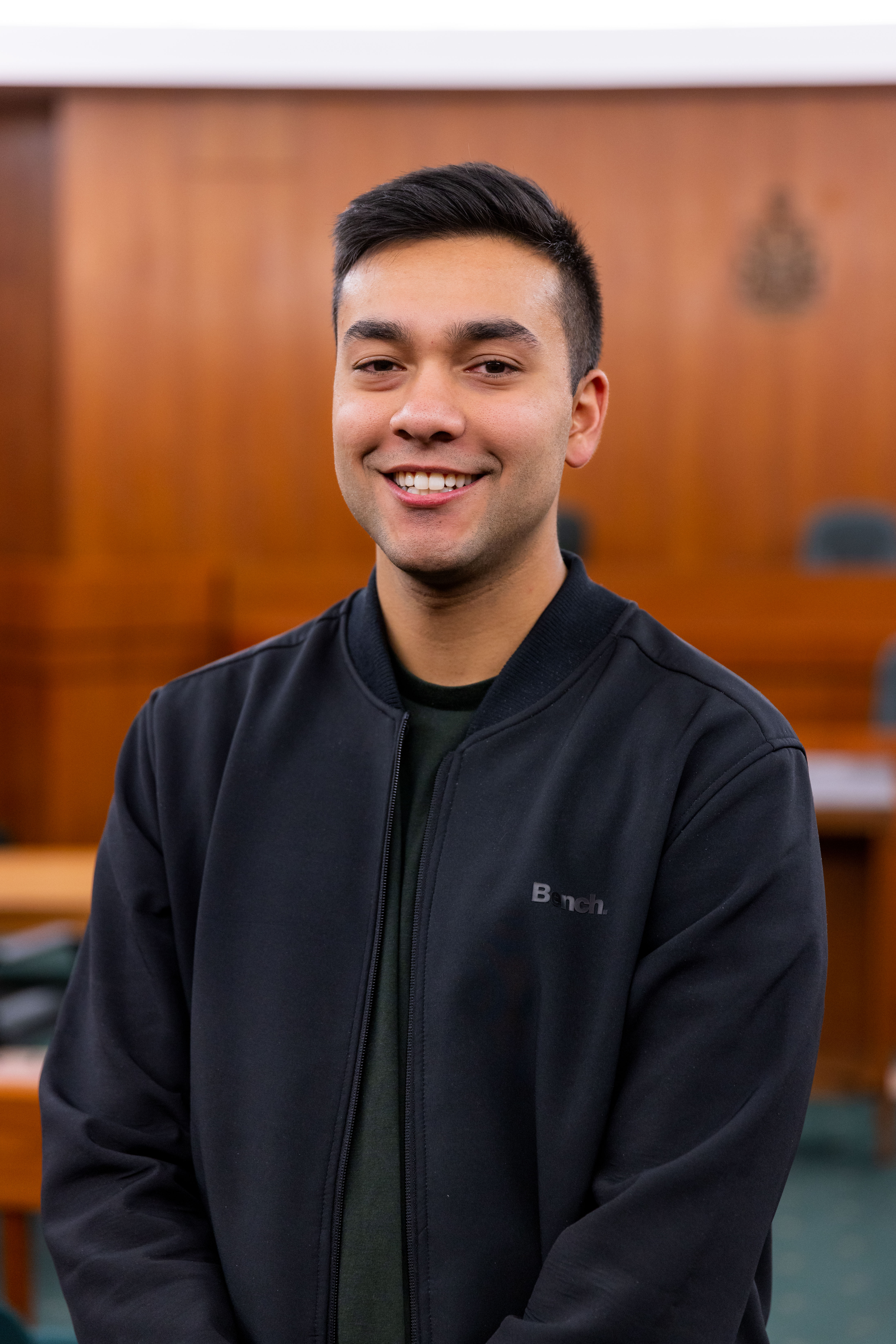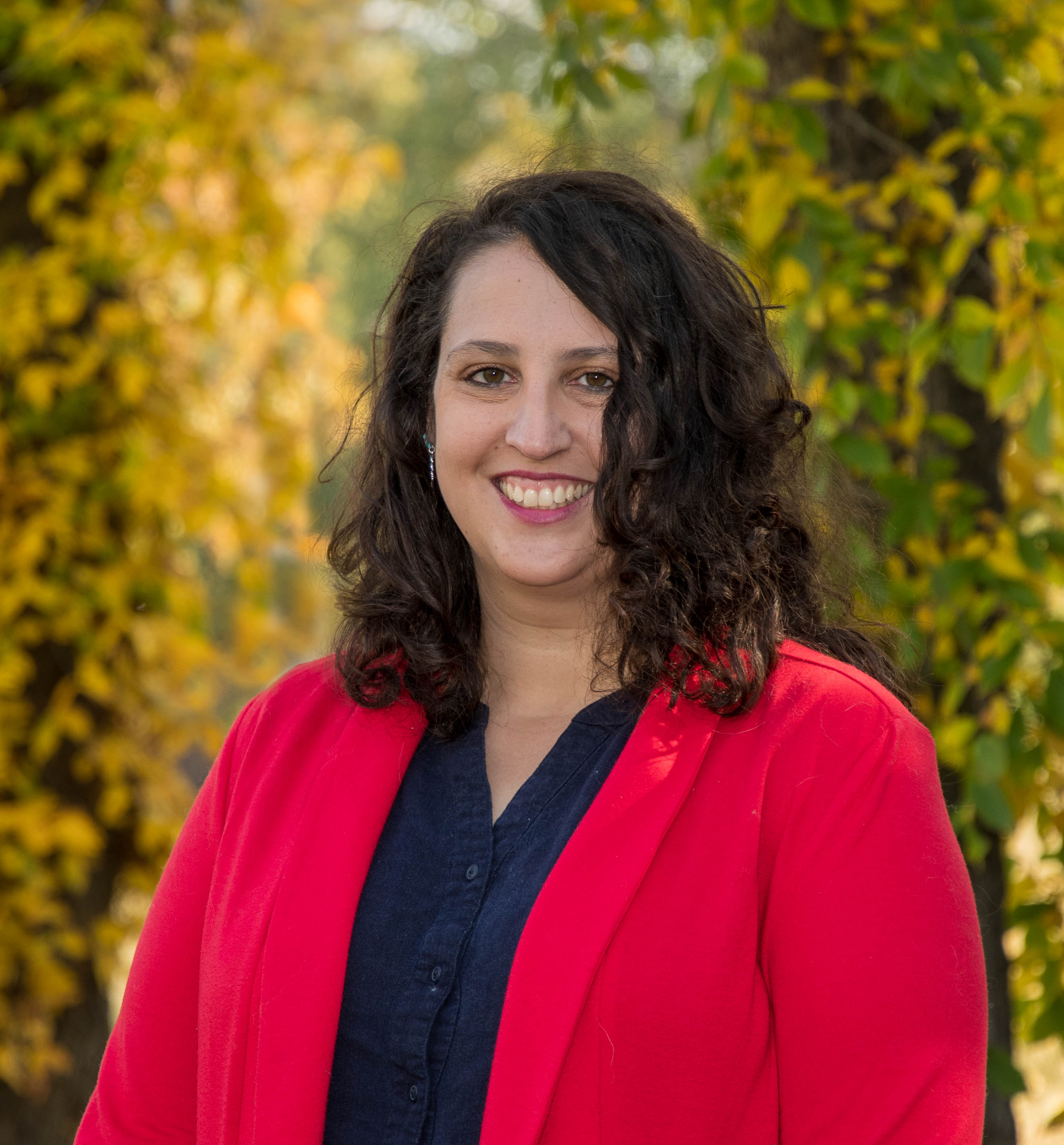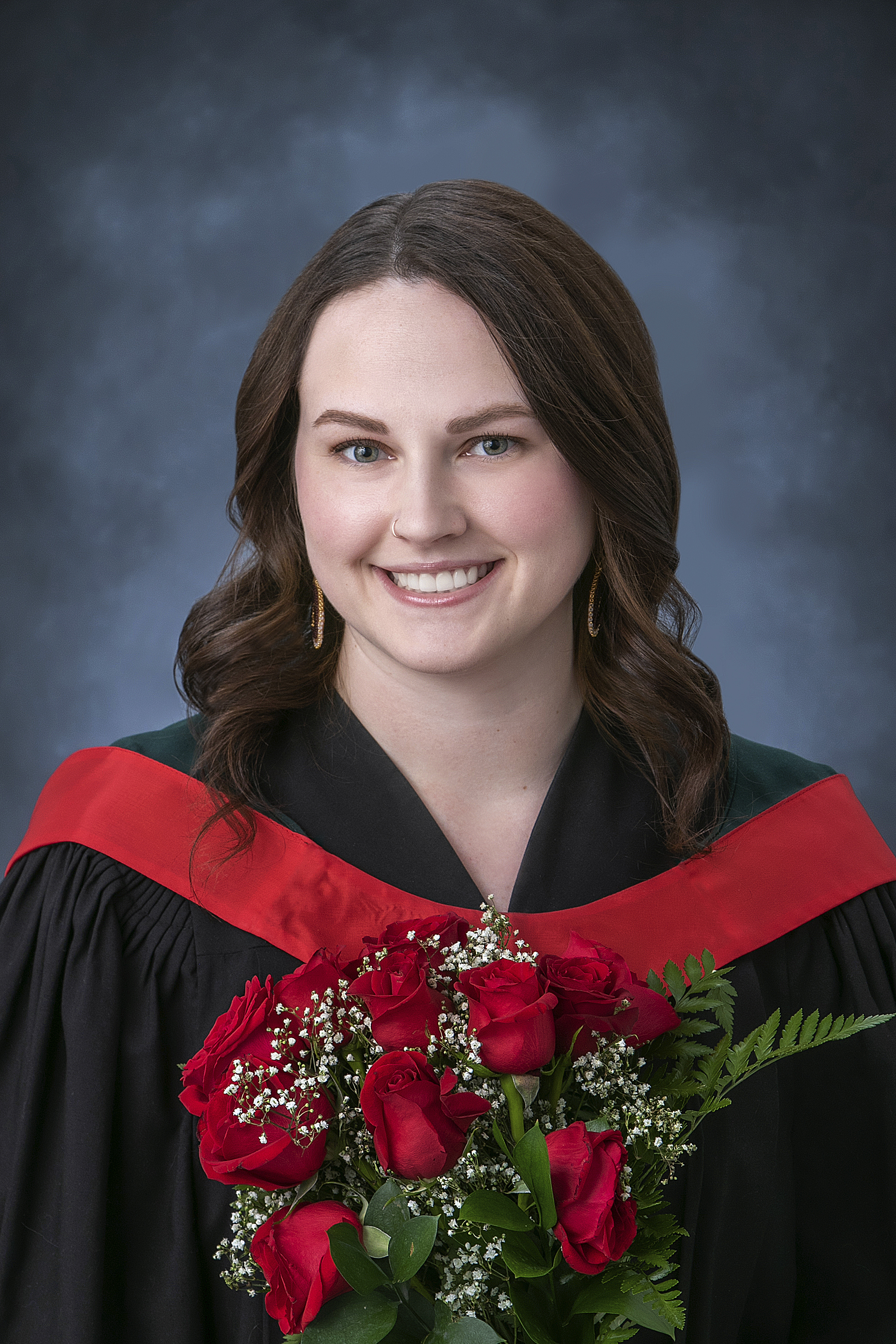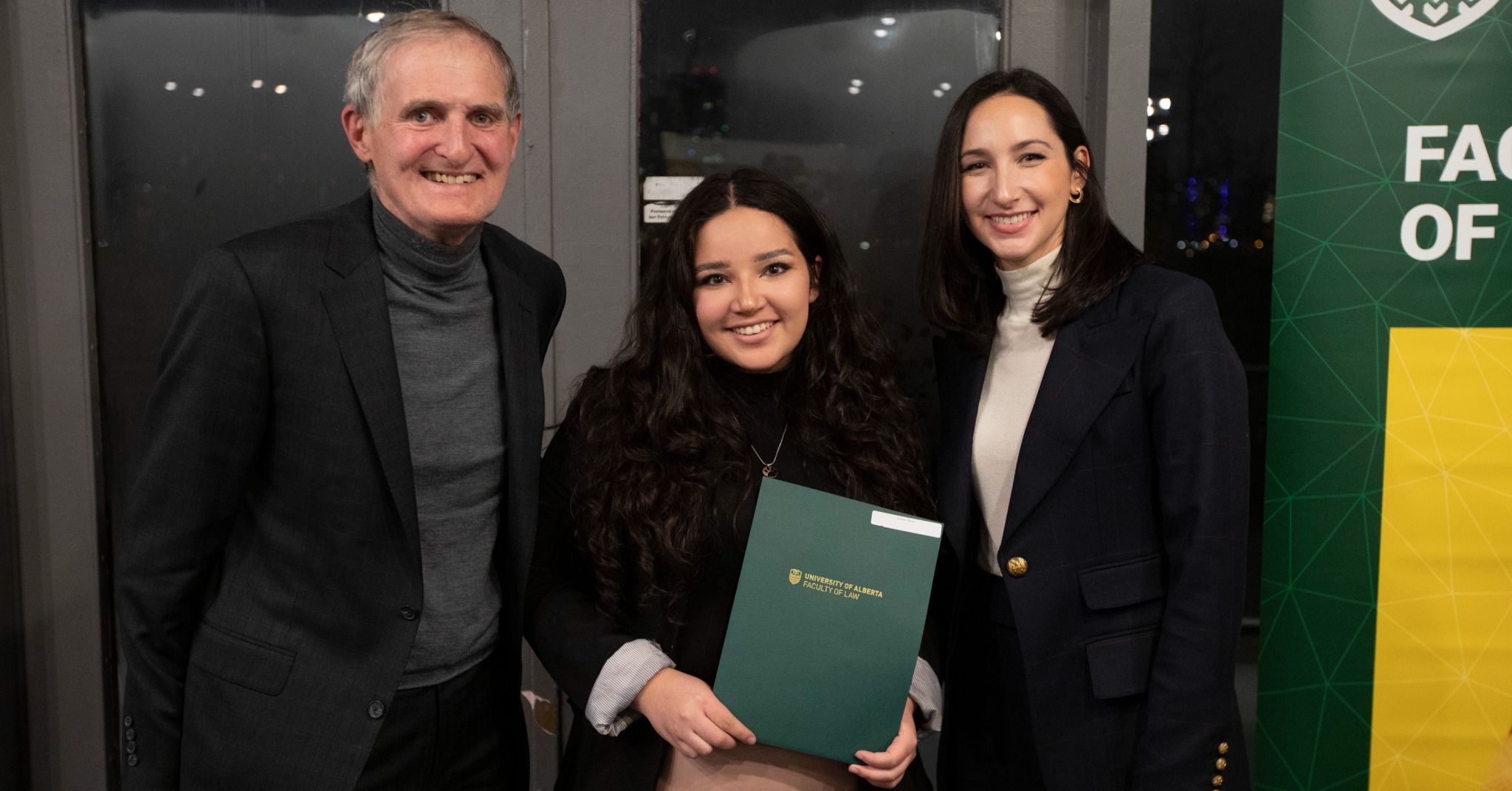New awards spark success
Sarah Kent - 3 August 2023
The road to success is rarely easy, but it has been made a little smoother for students at the Faculty of Law thanks to those who are investing in their futures.
Since 2020, the Faculty has added an impressive 15 new awards to its roster of financial support, made possible because of alumni and donors. Each year, the Faculty of Law distributes more than $1.2 million to incoming and upperyear law students in the form of scholarships, bursaries and prizes. Students are already feeling the positive ripple effects with six new awards offered in the 2022-23 academic year.
“Initiatives like these new awards and scholarships introduced by the Faculty are incredibly valuable to students,” says Azan Esmail, ’23 JD, an inaugural recipient of one of the new awards. “They provide much-needed financial support to students and alleviate some of the financial stress that can come with pursuing a legal education.”
But financial support is just one of the benefits of receiving a scholarship or award, says Esmail, who notes that it also positively affects students’ academic and professional development. “The recognition that comes with receiving an award or scholarship can be a powerful motivator and help build confidence and a sense of achievement.”
Significantly, the majority of the new awards are aimed at assisting students from equity-deserving and historically underrepresented groups. For Sarah (Johnson) Turcotte, ’23 JD, the inaugural recipient of the Gervin Métis Leadership Award in Law, these awards are critical.
“These new awards, especially those presented to students with varying and diverse identities and backgrounds, can play an important role making students feel more comfortable and welcome in law school,” she says. “Ultimately, they can assist in diversifying the legal profession.”
For many of the student recipients, donors’ investment has been the key to unlocking their full potential. From winning competitive moots to shouldering leadership positions, these recipients’ achievements are a reminder of the positive impact that donors can have in shaping the next generation of change-makers.
Here is a look at the new awards, the inaugural recipients and the donors paving the way for a promising tomorrow.
BARRY SJOLIE KC AWARD IN ADMINISTRATIVE LAW
 For Azan Esmail, ’23 JD, the Barry Sjolie KC Award in Administrative Law has given him the breathing room to focus on his studies and pursue novel learning opportunities.
For Azan Esmail, ’23 JD, the Barry Sjolie KC Award in Administrative Law has given him the breathing room to focus on his studies and pursue novel learning opportunities.
The award, given to a student who has completed the administrative law course, is based on academic standing, financial need and leadership in the community. The award was started by Edmonton’s Brownlee LLP in honour of Barry Sjolie, ’81 LLB, who had a distinguished career at the firm and is now retired.
“To the donor, I want to express my sincere gratitude for your generosity and support of my legal education,” says Esmail. “Because of donors like you, legal education has become far more accessible for me and other students in Alberta.
Esmail has an impressive track record as a competitive mooter. He was part of the winning team that took home first place at the Alberta Court of Appeal Moot in 2022. He also represented the U of A at the Gale Cup in 2023.
Esmail has also taken on leadership roles with the Law Students’ Association, supporting students through planning events and building relationships. The sense of community at the Faculty has been most meaningful to him.
UNIVERSITY OF ALBERTA OPPORTUNITIES AWARD IN LAW
 Law school had always been in the back of Megan Reti’s mind, but the timing never felt right until the pandemic gave her the push she needed. When the world seemingly stood still in 2020, Reti began studying for the LSAT.
Law school had always been in the back of Megan Reti’s mind, but the timing never felt right until the pandemic gave her the push she needed. When the world seemingly stood still in 2020, Reti began studying for the LSAT.
Fortunately for Reti, ’24 JD, a member of the Métis Nation of Alberta, the University of Alberta Opportunities Award in Law is available to mitigate some of the costs associated with law school. She is one of the inaugural recipients of the award, funded by the Faculty’s Exceptional Tuition Increase and presented to students who identify as members of equity-deserving groups. Nineteen awards were distributed in fall 2022.
The award not only recognizes students’ academic achievements but also helps break down the financial barriers that may prevent talented and deserving students from reaching their full potential. “This funding helps me keep my student loans and line of credit at a more manageable level, allowing me to worry less about finances and more about my exams and papers,” says Reti.
Reti is now the incoming chair for the Indigenous Law Students’ Association, a student group that has had a positive impact on her time in law school. One of her priorities as chair is to create a mentorship program that pairs incoming Indigenous law students with upper-year Indigenous students to help ease the transition to law school. The support network she found in ILSA, alongside financial support, has been key to her success.
“I’m the first person in my family to attend any kind of professional program and so I really didn’t know what to expect,” Reti says. “But I’ve managed to build a network of friends and colleagues who are so inspiring, motivating and supportive.”
CHIEF JUSTICE FRASER SCHOLARSHIP IN LAW
 Shelah Kwok, ’25 JD, is the inaugural recipient of the Chief Justice Fraser Scholarship in Law at the U of A. The scholarship, created by the Government of Alberta, honours alumna Catherine Fraser, ’70 LLB, who was the first woman to be appointed chief justice of a province in Canada.
Shelah Kwok, ’25 JD, is the inaugural recipient of the Chief Justice Fraser Scholarship in Law at the U of A. The scholarship, created by the Government of Alberta, honours alumna Catherine Fraser, ’70 LLB, who was the first woman to be appointed chief justice of a province in Canada.
“It is a privilege to be a part of Chief Justice Fraser’s legacy,” Kwok says. “I have been excited to learn about how Chief Justice Fraser has been a proponent of democracy, rule of law, as well as equity and fairness throughout her career. These values are what drew me to pursue a legal education.”
Kwok’s volunteerism and commitment to the community are extensive. While completing a political science degree, she volunteered with the Campus Food Bank and enrolled in the pathways program with U of A’s Community Service-Learning where she completed volunteer placements. It was through CSL that she interned on the social work team at Sage Seniors Association and later joined the nonprofit organization full-time.
“I discovered that I really enjoy connecting with people and assisting them in accessing resources and navigating different systems,” says Kwok, who credits her time in the nonprofit sector for what later affirmed her desire to pursue law.
Now in law school, she has dedicated her time to Student Legal Services’ criminal project, supporting low-income individuals facing criminal charges. She has also served as an executive member of U of A’s Federation of Asian Canadian Lawyers.
“This award has encouraged me to continue incorporating experiential learning and community involvement into my legal education,” Kwok says.
GERVIN MÉTIS LEADERSHIP AWARD IN LAW
 Sarah (Johnson) Turcotte, ’23 JD, has been proactive about surrounding herself with a community of people who are leading with purpose; her own leadership as a Métis law student has been recognized with a new award.
Sarah (Johnson) Turcotte, ’23 JD, has been proactive about surrounding herself with a community of people who are leading with purpose; her own leadership as a Métis law student has been recognized with a new award.
The Gervin Métis Leadership Award in Law recognizes involvement in Métis culture and leadership in the Indigenous community. The award was started by Mark Gervin, who was inspired to create the award by working alongside Métis colleagues at the Indigenous Community Legal Clinic at Peter A. Allard School of Law in British Columbia. Gervin notably created the award at several law schools across Canada.
“I would like to thank Mr. Gervin wholeheartedly for his generosity,” Turcotte says. “Awards like this one are so important for encouraging Métis students to take the leap and pursue higher education, which can inspire other Métis individuals to do the same, creating an important feedback loop that ultimately increases the number of Indigenous individuals in the legal profession, something that is so desperately needed.”
As an incoming student, Turcotte found law school daunting. She was a first generation law student and did not have friends in the legal profession to turn to for guidance. Those challenges were compounded by remote learning for her first year.
“As a Métis student specifically, it can be hard to figure out just where you fit in, but with the support of the Indigenous Law Students’ Association, my family and awards like this one, I have become more comfortable in my skin and more confident in speaking up and taking up space,” she says.
“Being presented with the Gervin Métis Leadership Award in Law has reassured me that I am exactly where I am supposed to be.”
PATRICIA L DAUNAIS QC MEMORIAL AWARD IN LAW
 Driven by a deep commitment to uphold his wife’s legacy, Keith Brown created the Patricia L Daunais QC Memorial Award to empower Indigenous law students to shape the future of the legal profession.
Driven by a deep commitment to uphold his wife’s legacy, Keith Brown created the Patricia L Daunais QC Memorial Award to empower Indigenous law students to shape the future of the legal profession.
The award supports Indigenous law students entering the first year of their JD degree. In addition to the academic standing requirements, the recipient must have demonstrated leadership, community engagement or volunteerism.
It pays tribute to alumna Patricia Daunais, QC, ’74 LLB, Brown’s wife of 36 years who passed away in 2022.
“On a personal level, she was my wife and best friend and a big part of both our families,” says Brown. “She was active in Calgary charities. She was well respected in the law community as a successful lawyer, mentor and contributor. She deserved to be remembered.”
After being called to the bar in 1975, Daunais had an impressive career in family law that spanned decades. She had numerous career highlights, from being named Queen’s Counsel in 1996 to serving as president of the Calgary Bar Association. In 2003, Daunais founded her own family law firm, Daunais, McKay & Harms. She was recognized for her contributions to the community in 2012 when she received the Women in Law Leadership in the Community award.
Speaking about her many achievements, Brown describes Daunais’s legal career as “outstanding.” He hopes that the award sets Indigenous law students on a similar path to success.
“Financial contributions to students are often essential to their achieving success in university,” he says. “The hope is that they turn that success into contributions to the legal community and society in general.”
Supporting Indigenous students in particular was an important way to memorialize Daunais’s life, says Brown. “Pat’s mother was Métis and born in Duck Lake, Saskatchewan, on Treaty 6 territory. The award recognizes both Pat and her mother.”
Sydney Mann, ’25 JD, is the inaugural recipient of the award.
AWARDS ON THE HORIZON
There is more light on the horizon for students in the Faculty of Law for the 2023-24 academic year. The Fasken Indigenous Entrance Award in Law is a new award that supports incoming Indigenous law students who have excelled academically and demonstrated a commitment to the community.
The Prowse Chowne LLP Award in Law will be awarded to a student in any year of the JD degree based on academic standing. Preference given to a student with a demonstrated interest in corporate or commercial law.
The Chief Judge Terry Matchett Award in Law will be presented to an Indigenous law student in any year of their JD degree. The award, funded by the Alberta Provincial Judges’ Association, honours the end of Terry Matchett’s tenure as chief judge of what is now Alberta’s Court of Justice.
The Justice DR Valgardson Award in Law will be awarded to the law student in the second or third year of their JD degree who has demonstrated leadership, community engagement, volunteerism and/or involvement in women’s issues or criminal law. Preference will be given to a student who is bilingual in Canada’s two official languages. The award was established by the Honourable Susan Richardson in honour of her retiring colleague and mentor, Justice Valgardson.
The inaugural recipient of the Violet King Henry Law School Award will be selected for the 2023- 24 academic year. The $20,000 award, supported by Miller Thomson LLP and first announced in fall 2022, will be given annually to a Black law student based on academic standing, demonstrated leadership and commitment to the advancement of equity, diversity and inclusion.